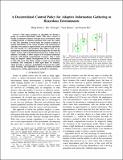| dc.contributor.author | Dames, Philip | |
| dc.contributor.author | Schwager, Mac | |
| dc.contributor.author | Kumar, Vijay | |
| dc.contributor.author | Rus, Daniela L. | |
| dc.date.accessioned | 2014-10-07T19:50:21Z | |
| dc.date.available | 2014-10-07T19:50:21Z | |
| dc.date.issued | 2012-12 | |
| dc.identifier.isbn | 978-1-4673-2066-5 | |
| dc.identifier.isbn | 978-1-4673-2065-8 | |
| dc.identifier.isbn | 978-1-4673-2063-4 | |
| dc.identifier.isbn | 978-1-4673-2064-1 | |
| dc.identifier.issn | 0743-1546 | |
| dc.identifier.uri | http://hdl.handle.net/1721.1/90616 | |
| dc.description.abstract | This paper proposes an algorithm for driving a group of resource-constrained robots with noisy sensors to localize an unknown number of targets in an environment, while avoiding hazards at unknown positions that cause the robots to fail. The algorithm is based upon the analytic gradient of mutual information of the target locations and measurements and offers two primary improvements over previous algorithms [6], [13]. Firstly, it is decentralized. This follows from an approximation to mutual information based upon the fact that the robots' sensors and environmental hazards have a finite area of influence. Secondly, it allows targets to be localized arbitrarily precisely with limited computational resources. This is done using an adaptive cellular decomposition of the environment, so that only areas that likely contain a target are given finer resolution. The estimation is built upon finite set statistics, which provides a rigorous, probabilistic framework for multi-target tracking. The algorithm is shown to perform favorably compared to existing approximation methods in simulation. | en_US |
| dc.description.sponsorship | United States. Air Force Office of Scientific Research (Grant FA9550-10-1-0567) | en_US |
| dc.description.sponsorship | United States. Office of Naval Research (Grant N00014-07-1-0829) | en_US |
| dc.description.sponsorship | United States. Office of Naval Research (Grant N00014-09-1-1051) | en_US |
| dc.description.sponsorship | United States. Office of Naval Research (Grant N00014-09-1-1031) | en_US |
| dc.language.iso | en_US | |
| dc.relation.isversionof | http://dx.doi.org/10.1109/CDC.2012.6426239 | en_US |
| dc.rights | Creative Commons Attribution-Noncommercial-Share Alike | en_US |
| dc.rights.uri | http://creativecommons.org/licenses/by-nc-sa/4.0/ | en_US |
| dc.source | Other univ. web domain | en_US |
| dc.title | A decentralized control policy for adaptive information gathering in hazardous environments | en_US |
| dc.type | Article | en_US |
| dc.identifier.citation | Dames, Philip, Mac Schwager, Vijay Kumar, and Daniela Rus. “A Decentralized Control Policy for Adaptive Information Gathering in Hazardous Environments.” 2012 IEEE 51st IEEE Conference on Decision and Control (CDC) (December 2012). | en_US |
| dc.contributor.department | Massachusetts Institute of Technology. Computer Science and Artificial Intelligence Laboratory | en_US |
| dc.contributor.department | Massachusetts Institute of Technology. School of Engineering | en_US |
| dc.contributor.mitauthor | Rus, Daniela L. | en_US |
| dc.relation.journal | Proceedings of the 2012 51st IEEE Conference on Decision and Control (CDC) | en_US |
| dc.eprint.version | Author's final manuscript | en_US |
| dc.type.uri | http://purl.org/eprint/type/ConferencePaper | en_US |
| eprint.status | http://purl.org/eprint/status/NonPeerReviewed | en_US |
| dspace.orderedauthors | Dames, Philip; Schwager, Mac; Kumar, Vijay; Rus, Daniela | en_US |
| dc.identifier.orcid | https://orcid.org/0000-0001-5473-3566 | |
| mit.license | OPEN_ACCESS_POLICY | en_US |
| mit.metadata.status | Complete | |
